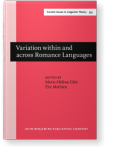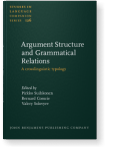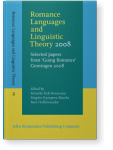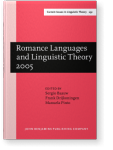Asier Alcázar
List of John Benjamins publications for which Asier Alcázar plays a role.
Articles
2014 Weight effects across verbal domains: The case of Spanish subjects Variation within and across Romance Languages: Selected papers from the 41st Linguistic Symposium on Romance Languages (LSRL), Ottawa, 5–7 May 2011, Côté, Marie-Hélène and Eric Mathieu (eds.), pp. 119–132 | Article
Abundant research reports that weight affects the position of postverbal constituents (Hawkins 2004; Wasow 1997, 2002; Wasow & Arnold 2003). Weight has been analyzed both as a constraint on production and processing. Our study analyzes whether increasing weight can shift subject position, which is… read more
2012 A deceptive case of split-intransitivity in Basque Argument Structure and Grammatical Relations: A crosslinguistic typology, Suihkonen, Pirkko, Bernard Comrie and Valery Solovyev (eds.), pp. 1–16 | Article
Differences in case marking and auxiliary selection in Basque intransitive verbs (Levin 1983; Ortiz de Urbina 1989; Hale & Keyser 1993; Laka 1995) seem sufficient grounds for changing the current typological classification of Basque from ergative (Dixon 1994; Primus 1999) to split-intransitive. One… read more
2010 In support of a syntactic analysis of double agreement phenomena in Spanish Romance Languages and Linguistic Theory 2008: Selected papers from 'Going Romance' Groningen 2008, Bok-Bennema, Reineke, Brigitte Kampers-Manhe and Bart Hollebrandse (eds.), pp. 1–16 | Article
Compound tenses may display double agreement in non-standard varieties of Spanish. Harris & Halle (2005) present a body of new data for affirmative imperatives, where third person plural -n is reduplicated (once or twice) or switches places with a clitic (metathesis). Kayne (2008) proposes a… read more
2007 The quirky case of participial clauses Romance Languages and Linguistic Theory 2005: Selected papers from ‘Going Romance’, Utrecht, 8–10 December 2005, Baauw, Sergio, Frank Drijkoningen and Manuela Pinto (eds.), pp. 1–18 | Article
Adverbial participial clauses exhibit quirky case properties. The internal argument of a transitive verb may bear accusative or nominative morphological case in Romance. Unlike gerundivals, these clauses lack T and v*, among other heads, undermining a standard case licensing approach. We propose… read more



